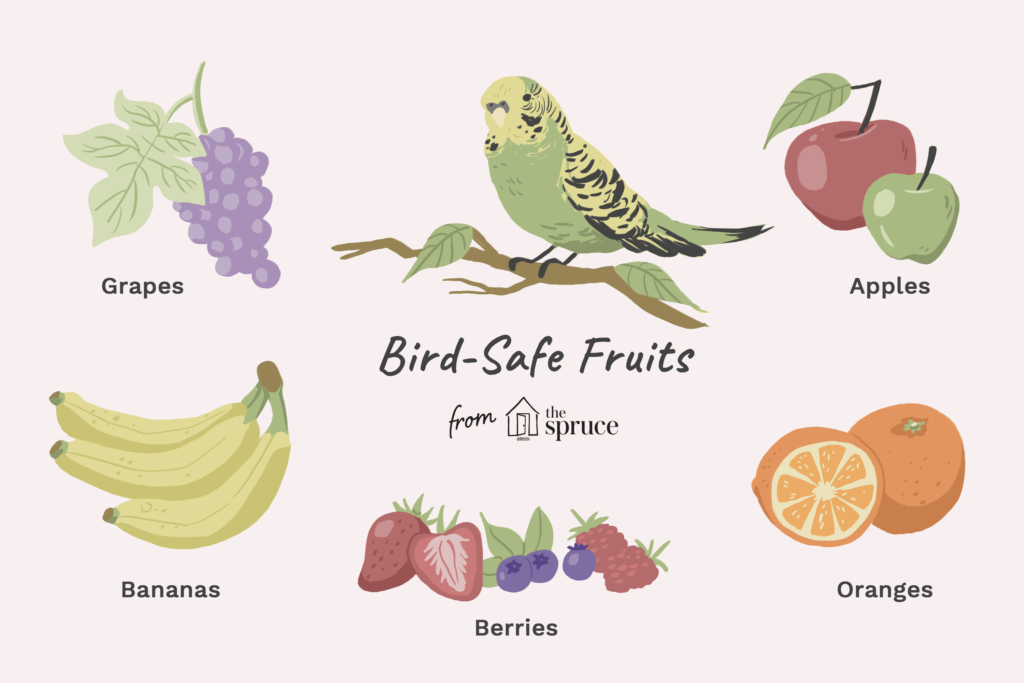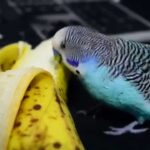Yes, lovebirds can eat strawberries. This fruit is a healthy snack for them when served in moderation.
Lovebirds, those vibrant and social little parrots, thrive on a diet rich in variety. Incorporating fruits like strawberries into their meals offers not only a delightful treat but also essential vitamins and minerals that contribute to their well-being. Owners should ensure strawberries are thoroughly washed to remove pesticides and cut into manageable pieces to prevent choking.
Offering strawberries occasionally can add to a lovebird’s balanced diet, alongside a mix of seeds, pellets, and other fruits and vegetables. Bear in mind that too much fruit can cause digestive issues, so moderation is key. Introduce strawberries slowly into their diet to ensure they are well-tolerated and enjoy watching your feathered friend relish this juicy berry.
The Safe Fruits For Lovebirds
Feeding lovebirds requires knowledge of safe fruits they can enjoy. Among these, strawberries are a sweet treat that not only taste delicious but also provide essential nutrients. Let’s dive into the world of fruits that are safe and beneficial for your feathery friends!
Fruit In A Lovebird’s Diet
Lovebirds, with their vibrant colors and energetic personalities, need a varied diet to stay healthy. Fruits offer vitamins, minerals, and fibers that are crucial for their wellbeing. Introducing fruits to a lovebird’s diet should be done gradually and in moderation. Safe fruits include:
- Strawberries: Packed with vitamin C
- Apples (without seeds): A source of vitamin A
- Grapes: Hydrating and tasty
- Bananas: Rich in potassium
- Melon: Full of antioxidants
Bear in mind, all fruits must be washed thoroughly to remove pesticides. Remove any seeds and pits that can be harmful to your bird.
Benefits Of Fruits For Avian Health
Incorporating fruits in a lovebird’s diet offers a range of health benefits. The right fruits can help prevent diseases, enhance feather quality, and support overall growth. Here are key benefits:
| Fruit | Key Benefit |
|---|---|
| Strawberries | Boost immunity with vitamin C |
| Apples | Improve vision with vitamin A |
| Grapes | Maintain hydration levels |
| Bananas | Support digestive health |
| Melon | Offer antioxidants for cellular health |
Fruits serve as a natural enrichment, encouraging foraging behavior and keeping lovebirds entertained. For the best results, offer a small portion of fruits alongside their regular diet.
Strawberries: A Bird-friendly Treat?
Have you ever wondered if your feathered friends can join you while you indulge in juicy strawberries? Good news! Lovebirds can enjoy strawberries as a healthy snack. These sweet, red berries are not just delicious; they also offer various health benefits for birds. Let’s explore the why and how lovebirds can safely savor this berrylicious treat!
Nutritional Values In Strawberries
Strawberries are packed with vitamins and nutrients essential for your lovebird’s well-being. Here is a quick glance at what these vibrant berries offer:
- Vitamin C – boosts immune health
- Fiber – aids in digestion
- Antioxidants – combat free radicals
- Potassium – supports heart function
These components make strawberries a splendid choice for an occasional birdy snack.
Potential Hazards Of Strawberries
While strawberries are healthy, some risks exist. Notable points include:
| Hazard | Details |
|---|---|
| Pesticides | Always choose organic strawberries or wash them well. |
| Sugar Content | High sugar can lead to health issues. Feed in moderation. |
| Seeds | Small seeds are not a problem, but feed small pieces to avoid choking. |
| Allergies | Watch for any allergic reactions when feeding strawberries for the first time. |
Consider these factors to ensure strawberries are a safe treat for your lovebird. A healthy diet makes a happy bird!
Preparing Strawberries For Your Feathered Friends
Are you wondering if your colorful companion can enjoy the sweet taste of strawberries? Preparing Strawberries for Your Feathered Friends is not only easy but also a healthful way to add variety to their diet. Let’s make sure that these tasty treats are safe and enjoyable for lovebirds to eat.
Washing And Cutting Techniques
- Always wash strawberries thoroughly under cold water to remove any pesticides or dirt.
- Pat them dry with a clean towel or let air dry.
- Cut off the leafy top and any other non-edible parts before serving.
- Chop the strawberries into manageable, bite-sized pieces to prevent any choking hazards.
Serving Size And Frequency
Even though lovebirds might find strawberries irresistible, moderation is key. Here’s how you can make strawberries a healthy snack:
| Serving Size | Frequency |
|---|---|
| 1-2 small pieces | 2-3 times per week |
Always remove any uneaten strawberries after a few hours to prevent them from spoiling and attracting pests.
Understanding Lovebird Dietary Needs
Little, lively, and full of color, lovebirds bring joy with their playful antics. Just like their vibrant appearance, their diet needs a rainbow of foods to stay healthy. Fruits often come up in conversations about lovebird snacks. But can lovebirds eat strawberries? Yes, they can! Introducing strawberries to your lovebird’s meal plan offers them both fun and nutrition. Let’s dive into the dietary balance needed for these delightful birds.
Balance In A Lovebird’s Diet
A lovebird’s diet is like a tightrope walker, needing perfect balance to excel. A varied diet ensures they get all the good stuff – vitamins, minerals, and energy. Strawberries are great, yet they are just a slice of the pie. Here’s what a balanced diet should look like:
- Pellets: They form the staple food, providing essential nutrients.
- Seeds: A treat, not a main dish, due to their high fat.
- Fruits and Vegetables: Fresh options for hydration and vitamins.
- Water: Fresh daily to keep them chirpy and hydrated.
This combo helps your feathered friend thrive. Their menu should look colorful and fresh, much like their personality.
Common Deficiencies And How To Avoid Them
Even birds can have off days, feeling a bit under the weather. This can happen when they miss out on key nutrients. Keep an eye out for these common deficiencies:
| Vitamin | Signs of Deficiency | Sources |
|---|---|---|
| Vitamin A | Dull feathers, respiratory issues | Carrots, spinach, strawberries |
| Calcium | Weak beaks, shaky legs | Broccoli, cuttlebone, leafy greens |
| Protein | Feather plucking, slow growth | Pellets, legumes, eggs |
Paying attention to their diet helps fend off these issues. Regularly include these foods to kick deficiencies to the curb. Strawberries, packed with vitamin C and antioxidants, are not just a treat but a health-boosting snack for your bird buddy.
Foods To Avoid Feeding Your Lovebird
It’s essential to know what foods your lovebird should avoid. While strawberries can be a healthy treat, some foods might harm your feathered friend. Awareness is key in keeping lovebirds safe from dietary dangers. Next, we explore specific foods to steer clear of for lovebird safety.
Dangerous Foods For Lovebirds
Lovebirds need a balanced diet to stay healthy. However, certain foods can lead to health issues and should always be avoided. Here’s a list of items to keep out of your lovebird’s reach:
- Avocado: Contains persin, toxic to birds.
- Chocolate: Theobromine in chocolate is harmful to lovebirds.
- Caffeine: Found in coffee, tea, and soda; can cause cardiac issues.
- Alcohol: Can lead to severe health problems, even in small amounts.
- Onion and Garlic: Can cause digestive and blood-related issues.
Identifying Unsafe Treats
Distinguishing safe from unsafe treats involves paying attention to several factors:
| Treat Type | Safety Level |
|---|---|
| Fruits with pits or seeds | Remove pits/seeds before offering. |
| Processed Human Foods | Usually unsafe due to additives. |
| Dairy Products | Generally avoided; birds can’t process lactose. |
| Fatty Foods | Can lead to obesity and related health issues. |
Always research before introducing new treats. When unsure, consult with a vet to ensure your lovebird’s diet remains risk-free and nutritious.
Credit: medium.com
Monitoring Your Lovebird’s Health
Caring for a lovebird means more than just providing a playful environment and companionship. What they eat, especially treats like strawberries, plays a crucial part in their overall wellbeing. A balanced diet contributes to a vibrant, active, and long-lived feathered friend. Observing the effects of their diet, such as introducing strawberries, is key to monitoring their health.
Signs Of Good Nutrition
A lovebird that is well-nourished will display several positive signs. These attributes signify that your feathered friend is receiving the right mix of nutrients:
- Bright, clear eyes are a window to their health.
- A lively demeanor shows well-being.
- Lustrous feathers without bald spots as proof of good health.
- Consistent weight indicates a balanced diet.
- Regular droppings that maintain a uniform consistency.
When To Consult A Vet
While occasional treats like strawberries can be beneficial, changes in your lovebird’s behavior or appearance may necessitate a vet visit. Identify concerning signs early to ensure your bird’s health does not decline.
| Concerning Sign | Action to Take |
|---|---|
| Dim or swollen eyes | Seek immediate vet care |
| Lethargy or lack of interest in activities | Consult with a vet to rule out illness |
| Changes in feather quality | Get a professional assessment |
| Fluctuations in weight | Monitor diet and consult a vet |
| Abnormal droppings | Visit a vet for health evaluation |
Incorporating Variety Into Your Bird’s Diet
Lovebirds thrive on diverse diets. Fresh fruits like strawberries can add both nutrition and excitement. Variety stimulates your lovebird’s senses and mirrors their natural foraging behavior.
A colorful, varied diet ensures essential nutrients reach your feathery friend. Strawberries are a hit. Their sweetness tempts even picky eaters. Still, moderation is key. Combine them with other safe options for a balanced diet.
Other Safe Fruits and VegetablesOther Safe Fruits And Vegetables
Lovebirds enjoy a range of fruits and vegetables. Here’s a list that can brighten their menu:
- Apple slices (without seeds)
- Banana chunks
- Carrot shreds
- Spinach leaves
- Peas in the pod
Ensure all foods are clean and free from pesticides before serving. These choices keep your lovebird healthy and happy.
Creating a Rotational Feeding ScheduleCreating A Rotational Feeding Schedule
Consistency is important. A rotational feeding schedule prevents boredom and promotes health. Here’s a simple weekly plan:
| Day | Meal |
|---|---|
| Monday | Apple and spinach |
| Wednesday | Strawberries and peas |
| Friday | Banana and carrot |
Alternate days can include pellets or seed mixes. This schedule keeps meals exciting and nourishing.

Credit: parrotjunkie.com
Engaging Your Lovebird With Food
Lovebirds show excitement through play and food. Engaging your Lovebird with Food can add fun to their routine. It’s a healthy and interactive way to bond. Plus, birds adore variety, especially something as tasty as strawberries. Fresh fruits make excellent treats and can pique their curiosity.
Interactive Feeding Techniques
Interactive feeding revitalizes your lovebird’s mealtime. Use these techniques to entertain and nourish:
- Skewer pieces of strawberry on a bird-safe kabob stick for pecking pleasure.
- Hide strawberry bits inside foraging toys.
- Offer strawberries by hand to encourage gentle nibbling.
- Create a fruit puzzle by placing strawberries in small containers that they can open.
Using Food To Strengthen Your Bond
Closeness with your lovebird grows when you feed them. Sharing treats builds trust. See these ideas to tighten your bond:
| Action | Effect |
|---|---|
| Hand-feeding | Enhances comfort with touch |
| Regular treat time | Creates routine and anticipation |
| Soft talking during treat | Associates your voice with good experiences |
Credit: www.quora.com
Conclusion
Feeding your lovebirds strawberries can be a delightful treat for them. Remember to serve in moderation and ensure proper cleaning to remove pesticides. Introduce new foods slowly and observe for any adverse reactions. Strawberries offer health benefits, but balance is key for your feathered companions’ diet.
Embrace variety for happy, healthy lovebirds.
Ryan Everhart is a passionate bird enthusiast and blogger, primarily writing on his website, Avian Whispers. His journey into the world of bird blogging began with a deep interest in parrots, a species that captivated his attention for their intelligence and social behavior. Over time, his content expanded to cover a broader range of bird species, offering insights into bird behavior, care, habitats, and conservation.
Ryan is dedicated to educating his audience, which includes both new bird owners and seasoned enthusiasts. His writing is filled with personal experiences, expert knowledge, and practical advice on bird care. Through Avian Whispers, he aims to foster a deeper appreciation for birds, emphasizing their role in nature and the joys of having them as pets.
Starting with articles focused on parrots, Ryan’s work now encompasses a diverse range of topics such as feeding, training, habitat enrichment, and bird health. His love for birds extends beyond parrots, diving into various avian species. His informative and heartfelt writing reflects his commitment to the well-being of birds and the desire to help others connect with these creatures.
As a growing voice in the bird blogging community, Ryan strives to provide a platform where bird lovers can learn, share experiences, and connect over a shared passion for avian life. His blogs are not only educational but also serve as a reminder of the importance of protecting and nurturing the bond between humans and birds.




